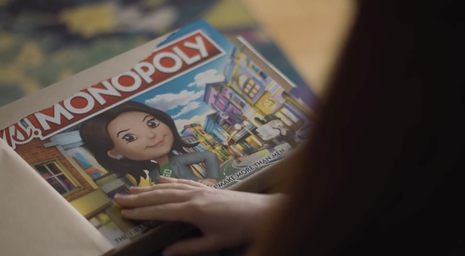The real Ms. Monopoly would have hated Ms. Monopoly
A viral advert obscures Monopoly’s murky past and highlights the hypocrisy of “woke” marketing, argues Eleanor Taylor

Last week an advert went Twitter-viral after one user challenged their followers to predict the product being sold. No one could. The advert opens to the statement ‘women hold just 10% of all patented inventions’ and showcases young women aiming to change that statistic with their own impressive creations.
The cinematography echoes a feminist short film as it depicts one young inventor detecting harmful dyes in soft drinks, another examining the collapse of sink-holes. The inspiring music swells to an unbelievable conclusion. This is a commercial for the board-game Ms. Monopoly.
“However, one crucial invention by a woman appears to be lacking – the game of Monopoly itself.”
Ms. Monopoly was released by Hasbro in 2019 with the eponymous mascot now a “self-made” investment guru – though being the niece of Monopoly’s Rich Uncle Pennybags doesn’t hurt. The gameplay functions identically to the regular Monopoly with a few differences. Upon starting, female players receive $400 more than their male friends and receive an extra $40 each time they pass Go.
The classic tokens of a ship and small dog have been replaced with the much more feminist wine-glass and dumbbell. The key distinction is a link to the advert – all the properties on the board are now inventions by women, ranging from Wifi and Space Station Batteries, to Spanx and chocolate chip cookies. However, one crucial invention by a woman appears to be lacking – the game of Monopoly itself.
The sour irony of Ms. Monopoly is nothing new to Monopoly’s history. For decades its invention was attributed to Charles Darrow who, after being made unemployed, had a bright idea to keep the nation entertained through the Great Depression, becoming the world’s first millionaire game designer. The rags-to-riches story eerily emulates Monopoly’s own politics, but in reality the earliest version, known as The Landlord’s Game, was created by a woman – Lizzie J. Magie.
The Landlord’s Game was not just family entertainment, but an educational tool designed to demonstrate the principles of the American economist Henry George. George’s 1879 book Progress and Property outlined his single-tax theory that land should be made common property. Magie intended that her game would demonstrate that property rent lend caused severe income inequality, hoping thatchildren would feel its innate unfairness. The game had two versions – the now well-known Monopolist version, and the Prosperity version in which the game was won when all players collaborated to raise their collective wealth.
Magie’s game first became popular in Georgist circles and universities; a socialist economics professor named Scott Nearing believed the game taught his students the ‘wickedness of land monopoly’. It later spread throughout the northeastern states in Quaker communities, where a friend learnt and taught it to Darrow. The railways and tokens were added, the politics was dropped. By the time Parker Brothers secured the rights to Monopoly in 1935, the game Magie had made to protest monopolies had mutated into one celebrating them.
“Ms. Monopoly’s advert plays into a familiar pattern of recent marketing trends.”
Born in Illinois in 1866, Magie grew up the daughter of well-known abolitionist and became a progressive and feminist. Her inventing was not limited to game-making; at just 26 she created a new stenography technique to accelerate typewriting. When she debuted this invention the number of patents held by women was even lower than the number cited in Ms. Monopoly’s 2019 advert – fewer than 1%.
Alongside game-making and engineering, Magie wrote, acted, reported news and starred in comedy. In protesting women’s wage inequality, she once jokily ran an advert in the local paper trying to auction herself off for better pay. Magie did not make anything from her game’s success, in fact her invention was a net loss. Hasbro refused to acknowledge her role until 2012.
Ms. Monopoly’s advert plays into a familiar pattern of recent marketing trends. In order to attract a generation of more socially aware customers, many brands are showcasing their products through progressive messaging, even though their own existence is directly opposed to it. Female empowerment has emerged as a strong theme often accompanied by a hashtagable slogan, for example, Always’ ‘Like a girl’ or EDF’s ’Pretty Curious’.
The sentiment rings hollow. Dove US’ marketing both espouses that ‘All Hair is Beautiful’ and offers products to buy if you’re ‘tired of flat, lifeless, boring hair’. The NikeWomen YouTube channel released their ’#BelieveInMore’ girl-power campaign the same year that female workers in their Cambodian factories suffered mass fainting - the women involved had been working 10-hour days in 37°C heat. Along with other sportswear brands, Nike saw 360 workers collapse within 3 days and 500 hospitalised over the year.
Each of the young inventors in the Ms. Monopoly advert received $20,580 to invest in their projects. The good deed and message promoting female inventors is undone by the irony of the game’s past. While Monopoly’s folk myth reflects the American dream, its history reflects American reality. Hasbro’s advert claims that the game aims to inspire women, but to do what? That they too could one day bankrupt their peers with real estate? The real Ms. Monopoly would have hated it.
 News / Eight Cambridge researchers awarded €17m in ERC research grants27 December 2025
News / Eight Cambridge researchers awarded €17m in ERC research grants27 December 2025 News / Clare Hall spent over £500k opposing busway 24 December 2025
News / Clare Hall spent over £500k opposing busway 24 December 2025 Comment / League tables do more harm than good26 December 2025
Comment / League tables do more harm than good26 December 2025 News / Caius mourns its tree-mendous loss23 December 2025
News / Caius mourns its tree-mendous loss23 December 2025 Comment / The ‘class’ of Cambridge24 December 2025
Comment / The ‘class’ of Cambridge24 December 2025










